HSE University at SPIEF: From Cyber Gaming to Arctic Development
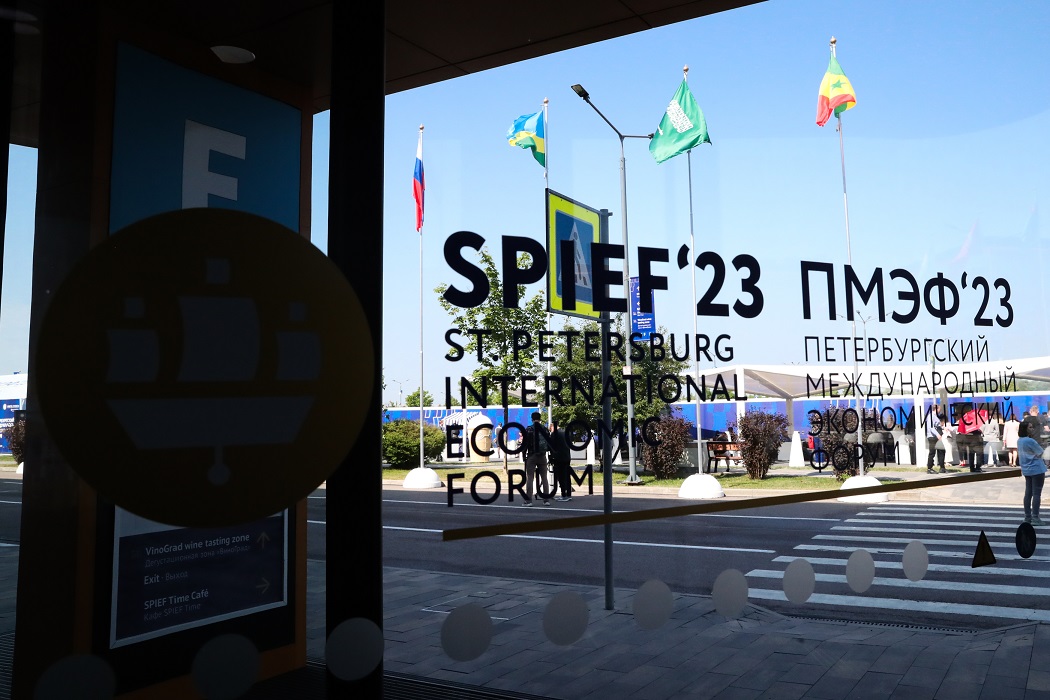
The timeliness of Russia’s first cyber gaming platform, the importance of closing the gender gap in the IT industry, and the future of international cooperation in the Arctic were just some of the issues discussed at the St Petersburg International Economic Forum (SPIEF). The HSE News Service reports on some of the topics of discussion at the forum.
Bridging Physical and Digital Spaces
‘Today we are discussing projects to create Russian software. In particular, at the booth of the Republic of Bashkortostan we are presenting the pilot project of Berloga, the first cyber platform in Russia,’ said Dmitry Zemtsov, moderator of the ‘Cyber-Physical Space: Made in Russia’ session and HSE University Vice Rector.
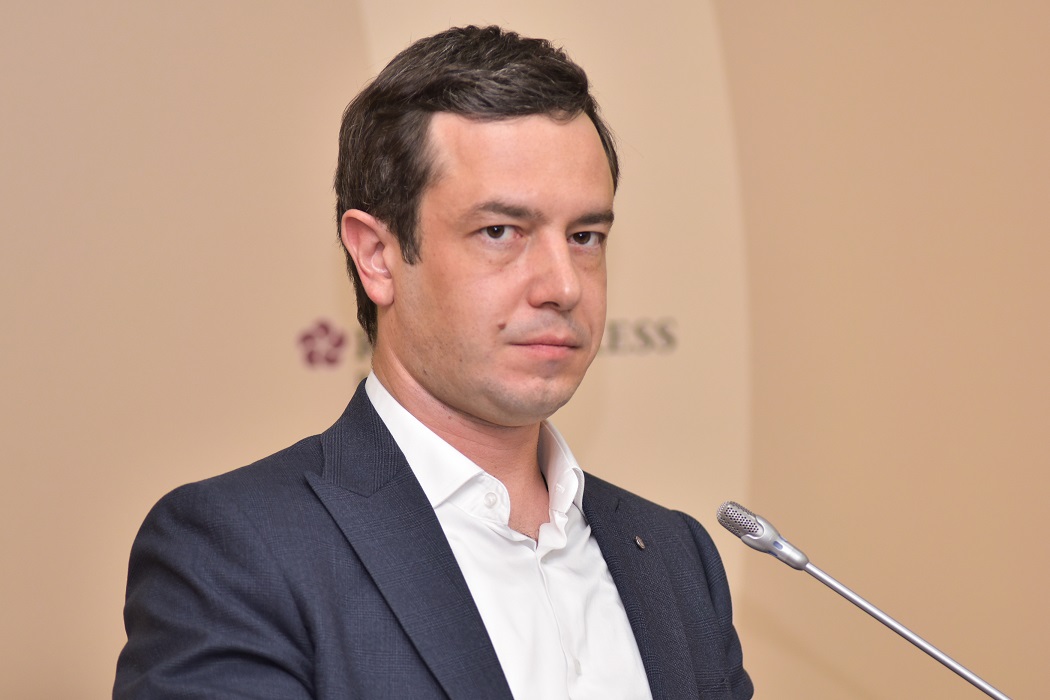
Given the circumstances facing Russia and the wider world at the moment, it may not seem like a time for games. ‘But right now, we are launching a large joint project to create a Russian gaming platform. How does this seemingly frivolous topic of games fit into the much more serious topics of digital and technological sovereignty?’ Dmitry Zemtsov addressed Dmitry Peskov, CEO of ANO National Technology Initiative Platform, Special Representative of the President of the Russian Federation on Digital and Technological Development.
Today, technological changes are happening rapidly, agreed Dmitry Peskov. ‘Therefore, habitual practices are replaced by new ones. And there are few people who can change along with these practices. The same thing happens in economics and politics. If you do not know how to use the opportunities of the modern world, you are not professional enough. And modern world opportunities are at the junction of physical and digital space.’
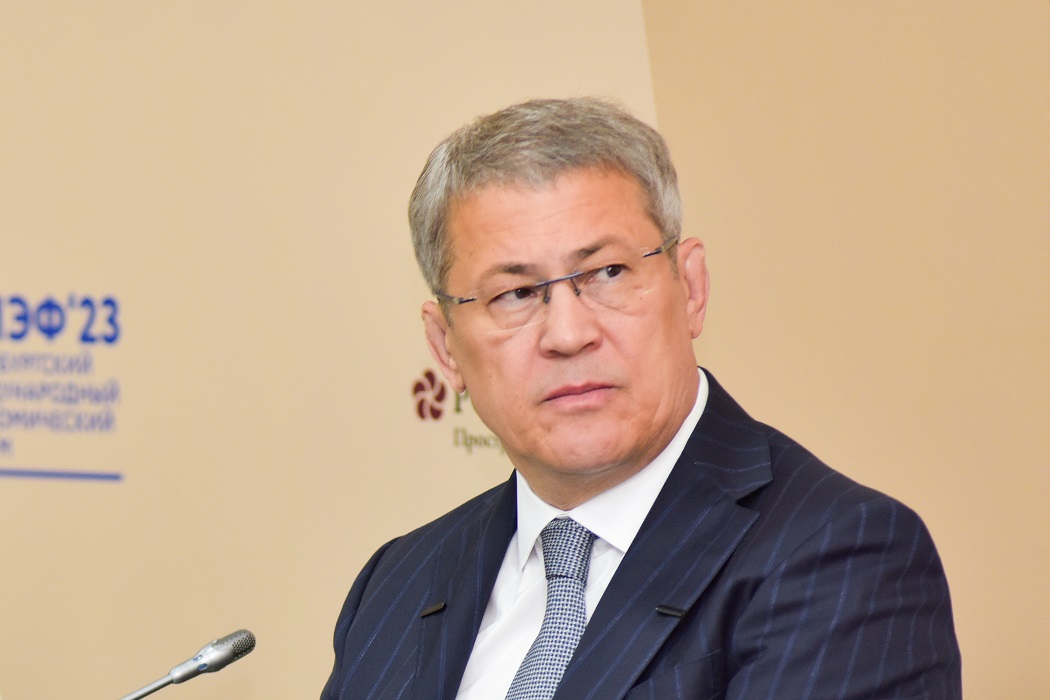
Head of the Republic of Bashkortostan Radiy Khabirov said that the development of the Berloga gaming platform is proceeding dynamically. Maxim Parshin, Deputy Minister of Digital Development, Communications and Mass Media of the Russian Federation, spoke about the fact that competitive programming is now an official sport in Russia. According to the deputy minister, it includes five disciplines: algorithmic programming, solving certain problems in approved languages, product programming, cybersystems programming, as well as robot and drone programming.
New Reality: Russian Sherpa Online from India
The session ‘International Cooperation of Women: New Opportunities for Scientific and Technical Development’ was moderated by Victoria Panova, HSE University Vice Rector and Russia’s Women 20 (W20) Sherpa. Guzelia Imaeva, General Director of the Analytical Centre of the National Agency for Financial Studies, co-moderated the event.
Victoria Panova participated in the session via a video link from India, where she worked at the W20 summit.
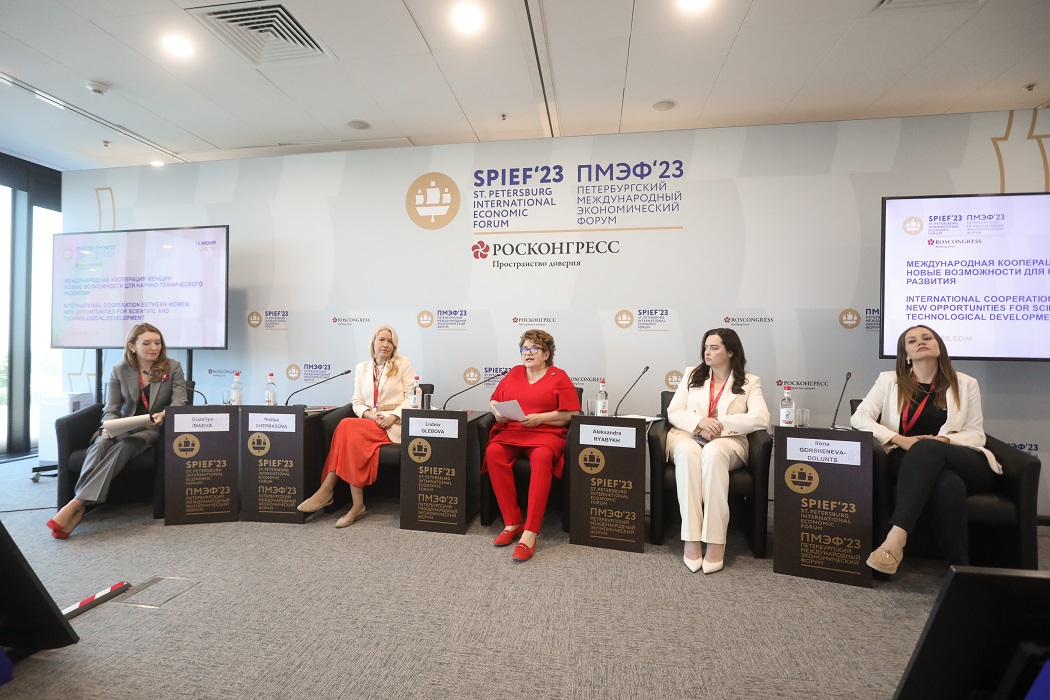
Victoria Panova stressed the priority importance of new technologies in achieving well-being and the need to achieve gender equality in access to digital technologies and resources. She gave the floor to W20 participants who wished to join SPIEF.
Hadriani Uli Silalahi, W20 Sherpa of the Republic of Indonesia and Vice President of the Indonesian Women’s Congress (KOWANI), said that the organisation is actively engaged in the education and training of women entrepreneurs. It develops programmes to increase women’s access to work in a number of industries and to digital literacy.
Dorothy Gordon, Chair of the UNESCO ‘Information for All’ Programme and Board Member of the UNESCO Institute for Information Technologies in Education, said that it is important to utilise the potential of new technologies to effect positive change in society and to promote the participation of women in the IT industry. At the same time, the gender gap in access to digital resources should be closed.
Dorothy Gordon spoke about the experience of the Khanty-Mansi Autonomous Okrug, where digital technologies have become available to the indigenous peoples of the North. ‘This Russian experience should be shared,’ the UNESCO representative believes.
The session was also attended by Marina Medvedeva, Board Member and Managing Director of SIBUR; Alexandra Ryabykh, co-founder of the Association of Women in the Nuclear Industry Foundation; Nadia Cherkasova, Vice President of the All-Russian Public Organisation of Small and Medium Enterprises OPORA RUSSIA; Ilona Gorsheneva-Dolunts, Director and owner of the InterBiz logistics company; Sibulele Poswayo, South African delegate to the W20, chairperson and founder of the Movement Against Inequality; Gülden Türktan, founding president of the Women 20, Turkey’s W20 Sherpa, and member of the Presidential Council of the Women Entrepreneurs Association of Turkey (KAGIDER).
The Arctic: A Region of Cooperation
Preservation of the natural environment and the indigenous peoples of the Arctic requires maintaining connections between the states involved in the region, despite political confrontations. The development of the region will require the engagement of all interested parties. The problems and prospects of the ‘top of the world’ were discussed by the participants of a session titled ‘The Arctic as a Unique Area of International Cooperation: Prospects and Opportunities’ moderated by Anastasia Likhacheva, Dean of the HSE University Faculty of World Economy and International Affairs
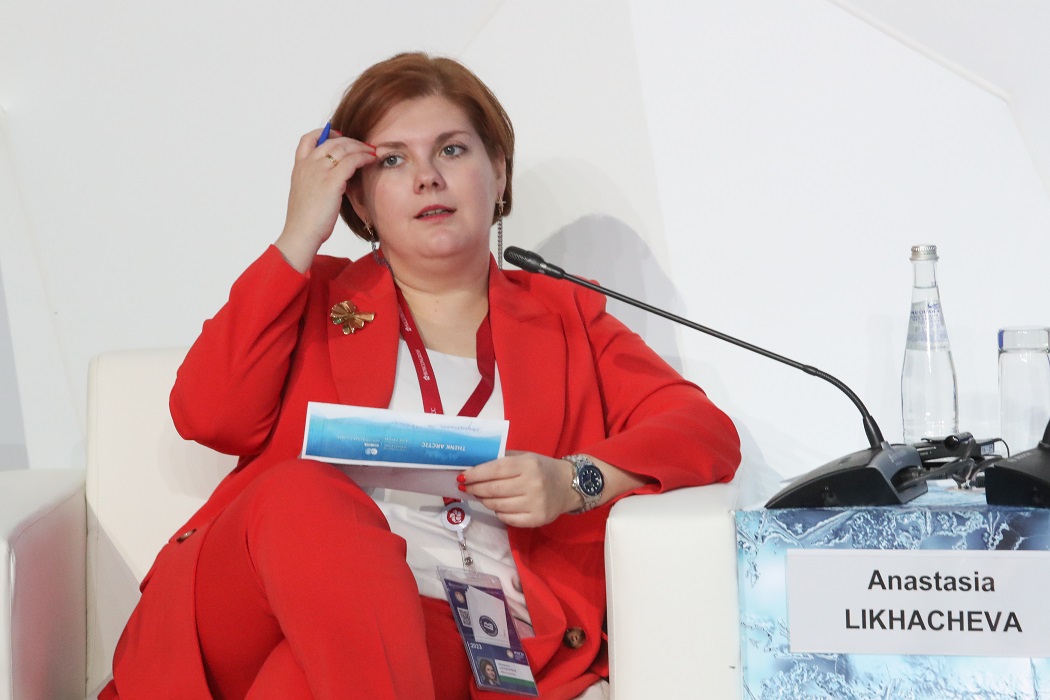
‘Experts point out that the Arctic will not wait for politicians to settle their differences,’ she said. Countries located far from the Arctic Circle may also suffer from the deterioration of the natural and climatic situation in the Arctic. ‘We want to show why and how we can collaborate. I will ask our participants to share their ideas on what to do first, since a lot of time has been lost,’ explained the dean.
Ambassador-at-Large of Russia’s Ministry of Foreign Affairs Nikolay Korchunov noted that the Arctic is becoming more prominent on the global agenda, its economic and geopolitical role is growing, and countries outside the circumpolar region are showing interest in it. Russia believes that there are no problems in the Arctic that require a military solution. International norms clearly define the rights of coastal and other states and provide a solid basis for solving regional problems. Russia’s policy priorities are the region’s sustainable development and protecting its environment while taking into account the needs of the entire population, including the indigenous peoples of the North. Russia is committed to multi-vector interaction and interested in depoliticised dialogue. The diplomat named the countries of the Persian Gulf and Latin America as promising non-regional partners in terms of Arctic cooperation.
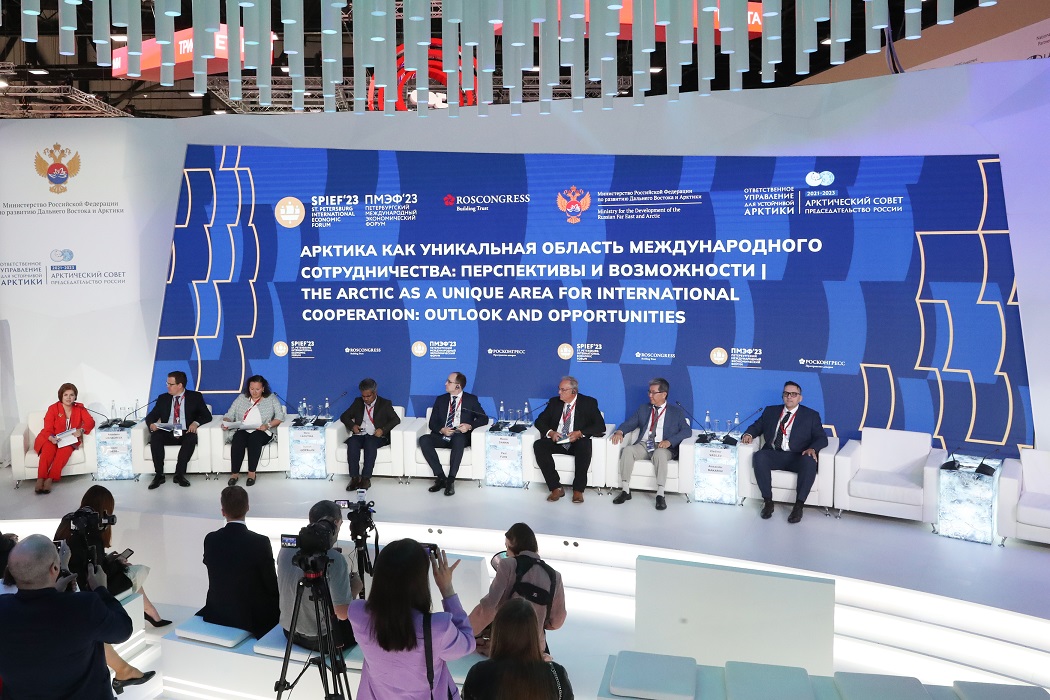
Maxim Dankin, Director of the Department for the Development of the Russian Arctic Zone Infrastructure Projects, highlighted the interest of many countries in Arctic cooperation. These include countries of the Asia-Pacific Region (China, India, and Korea) and those in the Persian Gulf and Latin America. Russia is now interested in developing foreign and domestic tourism in the region and expanding scientific cooperation on Spitsbergen.
Glenn Diesen, Professor of the Department of Business, History and Social Sciences at the University of South-Eastern Norway, expressed regret that the former format of Arctic cooperation has been disrupted. The situation is further complicated by the entry of Finland and Sweden into NATO, which will lead to militarisation of the region. He emphasised that cooperation in the Arctic is impossible without Russia, and pointed out the importance of expanding the number of participants in Arctic dialogue due to the inclusion of non-Arctic countries.
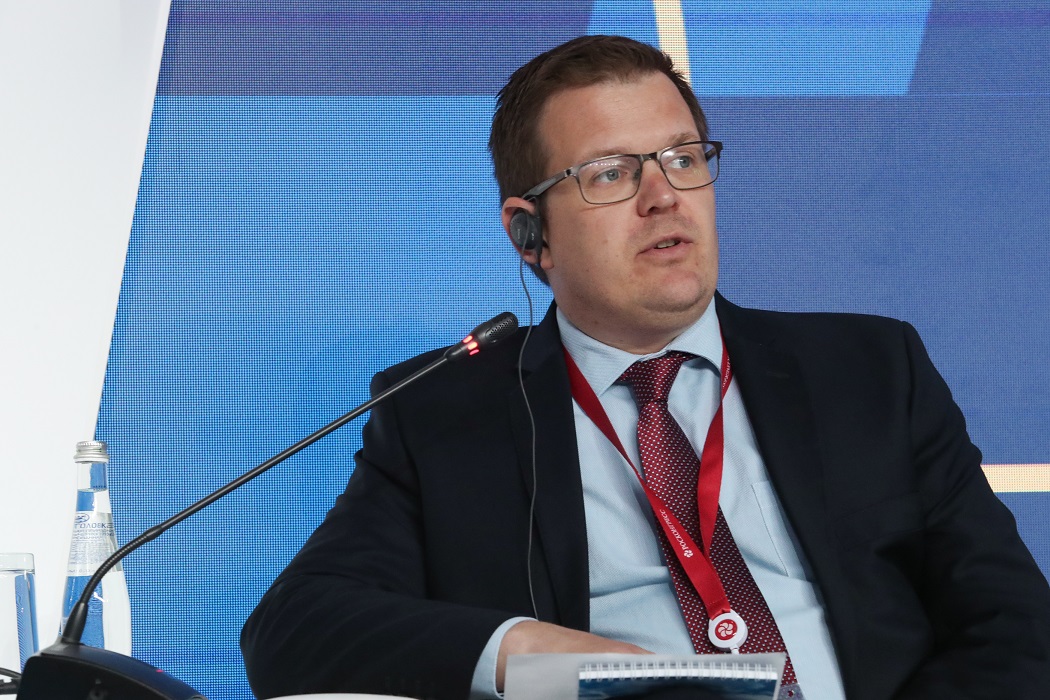
According to Glenn Diesen, cooperation in the Arctic is moving towards non-Western countries that are more engaged in energy interaction and the development of the Northern Sea Route (NSR). Interest in the Arctic is growing not only in Japan, but also in India, China, and Brazil. ‘The Arctic Council must remain a key institution and reflect the growing multipolarity. The Arctic must remain immune to geopolitics,’ he concluded.
Guo Peiqing, Professor of the School of International Affairs and Public Administration at the Ocean University of China, Executive Director of the China Ocean Policy Institute, said that complications in cooperation with Western countries in the Arctic require the development of a new concept and content of cooperation in the Arctic. It is hard to separate the region from the European agenda, but it is practical to pay more attention to other partners. This will be the first step in discussing further development of the region.
China, explained Guo Peiqing, is interested in the development of international tourism, energy, and transport, since transportation along the NSR will reduce the costs of logistics. He highlighted the creation of an insurance and security system for ships and cargo following the NSR. ‘It is also a matter of protecting the Arctic nature,’ the scientist added.
See also:
'We Are Open to Cooperation on an Equal Basis and Will Find a Path to a Better Future'
How are digital platforms contributing to sustainable development? How is international cooperation progressing in Eurasia? How should the Russia-India business dialogue proceed? HSE University's scientists presented their answers during expert discussions at the St Petersburg International Economic Forum.
HSE Distinguished Professor Sergey Karaganov Moderates Plenary Session at SPIEF
At the plenary session of the St Petersburg International Economic Forum (SPIEF), Russian President Vladimir Putin participated alongside the Presidents of Bolivia and Zimbabwe, Luis Alberto Arce Catacora and Emmerson Dambudzo Mnangagwa. For the first time, a representative from HSE University—Sergey Karaganov, Academic Supervisor of the Faculty of World Economy and International Affairs and HSE’s distinguished professor—served as the moderator of the plenary session.
HSE University Experts Take Part in Preparing Report ‘Russia—Oman—Partnership Prospects’ at SPIEF 2024
The report, prepared by the Roscongress Foundation and experts of the HSE Institute for Public Administration and Governance, covers the current situation in the economy of the Sultanate of Oman and the prospects for Russian-Omani partnership. Prior to SPIEF 2024, HSE was the first Russian university to sign a cooperation agreement with the University of Nizwa (Oman).
Qatari Ambassador Ahmed Al Thani Visits HSE University
During the St Petersburg International Economic Forum, HSE University-St Petersburg hosted Sheikh Ahmed bin Nasser bin Jasim Al Thani, Ambassador of Qatar to the Russian Federation.
HSE University at SPIEF: Smart Migration and the Future of the Global Economy
Sessions attended by HSE University experts at the recent St. Petersburg International Economic Forum focused on the digitalisation of migration management, regionalisation of the world economy, participation of companies in global value chains, and many other topics. Below, HSE News Services covers some of the main sessions of the event.
HSE University and Rossotrudnichestvo Agree to Train Specialists in Teaching Russian as a Foreign Language
HSE University and Rossotrudnichestvo have signed an agreement to establish a Russian Language Centre at HSE University in St Petersburg. It will train teachers of Russian studies and future leaders of educational programmes and courses of Russian as a foreign language. The document was signed by HSE University Rector Nikita Anisimov and Head of Rossotrudnichestvo Yevgeny Primakov at the St Petersburg International Economic Forum.
HSE University and Agency for Strategic Initiatives Sign Cooperation Agreement
HSE University and the Agency for Strategic Initiatives (ASI) have agreed to cooperate in the development of new technologies, the digital transformation of the economy, and the social development of the country. The agreement was signed by HSE University Rector Nikita Anisimov and ASI Director General Svetlana Chupsheva at the St Petersburg International Economic Forum.
HSE University Concludes 12 Cooperation Agreements as Part of SPIEF
During the St. Petersburg International Economic Forum, HSE Rector Nikita Anisimov signed cooperation agreements with regional heads, university rectors, heads of companies, government agencies, public organisations, and cultural institutions. This cooperation with new partners will cover a wide range of areas—from educational and research projects to student expeditions and youth policy.
‘Today’s Young People Strive to Be Involved in Socially Significant Activities’
Youth as a driver of economic development, the Arctic as a region of constructive cooperation, and innovation as a way to dispel illusions. Experts from HSE University took part in sessions of the 2022 St Petersburg International Economic Forum and HSE Rector Nikita Anisimov answered questions in the interactive studio of the Knowledge Society.
'Your Biggest Competitor in Life Will Always Be Yourself'
HSE representatives attended the St. Petersburg International Economic Forum and contributed to many of its sessions. What technologies, approaches and strategies are relevant in this new reality we find ourselves in? HSE Rector Nikita Anisimov, HSE Academic Supervisor Yaroslav Kuzminov and other experts offered their perspectives on these issues during panel discussions.


